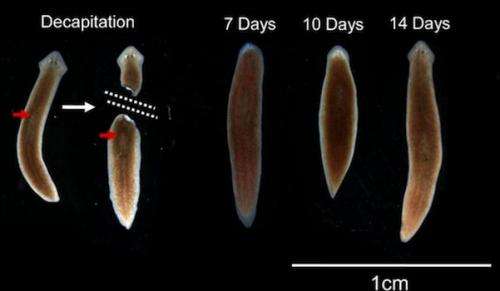July 12, 2013 report
Researchers discover flat worms retain memories even after decapitation

(Phys.org) —A pair of researchers from Tufts University has found that a type of flat worm is able to remember events that transpired prior to having its entire head removed. In their paper published in The Journal of Experimental Biology, Tal Shomrat and Michael Levin describe how they taught flat worms to tolerate light and space then cut off their heads. After their heads grew back, the researchers found, after some minimal prodding, the worms continued to tolerate light and space.
Planarian flatworms are used in biology research a lot because they have the unique ability to regenerate parts of their bodies when needed. Prior research has shown that this remarkable ability is due to their bodies being made up of 20 percent pluripotent stem cells. In this new effort, the researchers wondered if the worms would be able to remember things they had learned if their heads were removed and allowed to re-grow.
To find out, they constructed a computer controlled apparatus that helped teach several of the worms to tolerate light and open spaces—normally the worms are extremely averse to both. The learning process took approximately 10 days. Once they had the worms moving without apprehension towards food in the middle of a lighted Petri dish, they collected them and cut off their heads, removing all traces of their brains. Then, they allowed the worms time (14 days) to regenerate the lost body part. Once that process was completed, the researchers put the worms back in the lighted Petri dish to see if the learning they had received earlier was retained.
The worms didn't take to the food right away—it took one training session, but that was it. After that, the worms exhibited no apprehension in moving to the center of the dish under a bright light—a clear indication that they had somehow retained the training they had received prior to decapitation. How they did so, remains a mystery. The researcher suggest a change in the worm's DNA might have occurred as part of the learning process, or that other parts of the worm's body are used to retain memory in ways that are not understood.
The research duo will be continuing their research with the worms with the hope of uncovering the secret of how they retain their memories after brain dismemberment.
More information: An automated training paradigm reveals long-term memory in planaria and its persistence through head regeneration, Journal of Experimental Biology, First posted online July 2, 2013. doi: 10.1242/jeb.087809
Abstract
Planarian flatworms are a popular system for research into the molecular mechanisms that enable these complex organisms to regenerate their entire body, including the brain. Classical data suggest that they may also be capable of long-term memory. Thus, the planarian system may offer the unique opportunity to study brain regeneration and memory in the same animal. To establish a system for the investigation of the dynamics of memory in a regenerating brain, we developed a computerized training and testing paradigm that avoided the many issues that confounded previous, manual attempts to train planaria. We then used this new system to train flatworms in an environmental familiarization protocol. We show that worms exhibit environmental familiarization, and that this memory persists for at least 14 days – long enough for the brain to regenerate. We further show that trained, decapitated planaria exhibit evidence of memory retrieval in a savings paradigm after regenerating a new head. Our work establishes a foundation for objective, high-throughput assays in this molecularly-tractable model system that will shed light on the fundamental interface between body patterning and stored memories. We propose planaria as a key emerging model species for mechanistic investigations of the encoding of specific memories in biological tissues. Moreover, this system is likely to have important implications for the biomedicine of stem cell-derived treatments of degenerative brain disorders in human adults.
Journal information: Journal of Experimental Biology
© 2013 Phys.org



















